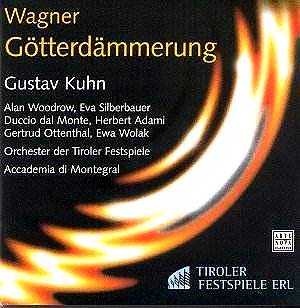This is the third release in Arte Nova’s bargain basement
Ring recorded "live" at the Tyrol Festival and conducted by
the businesslike Gustav Kühn. I reviewed Siegfried
Nov00 and Das Rheingold is also available with just Die Walküre
to go, presumably next year. There is no doubt that there has been a
need for a bargain priced stereo Ring for many years and this cycle
does have virtues, though it also has a number of vices which the present
issue illustrates.
You will notice that I used the word "businesslike"
to describe the conducting of Gustav Kühn and this principally
shows itself in his choice of a very fast overall tempo in the long
stretches of this massive opera. In fact this may well be the fastest
Götterdämmerung on record. Faster even than Boulez on Philips
(434 424-2), but Boulez has the advantage over Kühn of a keener
intelligence, better singers, director and the Bayreuth tradition behind
him. There are certainly times when these tempi from Kühn bring
a gain in drama and excitement, though. For example the build up to
the entry of Siegfried in Act I means that when our hero does arrive
the tension has become palpable. On the whole, however, such brisk tempi
rob the more reflective passages of their mystery and power and the
whole of its cumulative charge. Wagner is both peaks and troughs; both
must cohere. Here it is as if Kühn wants it all to be peaks where
the troughs bore him rather. A case in point would be the scene at the
start of Act 2 known as "Hagen’s Watch" where Hagen’s father
Alberich appears to probe into Hagen’s innermost being giving us one
of Wagner’s most elemental scenes. All sense of the dark dread that
lies over Wagner’s marvellous writing for the voices is lost when the
singers have to keep up with this pace. But Siegfried’s Narration in
Act 3 is lyrical enough and quite moving. On the whole the "scratch"
festival orchestra acquit themselves well and accurately considering
they were recorded "on the wing" and they play better than
they did in the recording of Siegfried from last year. But don’t expect
Vienna Philharmonic or Bayreuth Festival standards. This orchestra is
lacking in the kind of "saturation tone" that Wagner really
needs and which the Philharmonics of Vienna or Berlin can deliver.
Of the singers the tenor Alan Woodrow is again the
most impressive as Siegfried. He has one matchless asset for a singer
in this role in that he doesn’t appear to tire and whilst there is still
some way to go before he shows signs of whether he will rise to the
elect, I enjoyed his performance very much. I have already drawn attention
to his narration which, after all, comes quite late in the evening.
We have a different Brunhilde this year in Eva Silberbauer. This is
a pity as her voice lacks firm foundation and soon becomes a trial,
most especially in the Immolation Scene at the end of Act 3 where she
is clearly struggling. A case of "too much too soon" for this
singer, I think, and I am not at all sure that she has really thought
deeply enough into the nature of her role either. When she is matched
with the Waltraute of Ewa Polak in their great scene one of Wagner’s
greatest inspirations in spoilt by the shortcomings of both singers
as well as the fact that Polak sounds more like Brunhilde’s mother than
her sister. This scene itself was clearly directed on stage to be mobile
too, as there are times when the voices are almost lost to the microphones.
This kind of thing is always a problem when taping "live"
and how much of a problem it is to the person listening all depends
on how much you like "live" performances. I like them very
much and had the two singers been much better I would have happily put
up with their perambulations. There are stage noises elsewhere but nothing
to get too concerned about if, as I say, you like "live" recordings.
The rest of the cast is adequate enough but inevitably any experienced
Wagnerite starts to compare them with others on record. Unfair, perhaps,
but inevitable. You should also be aware that the booklet contains only
a libretto in German with no translation.
I really cannot escape the belief that Wagner is not
a bargain basement composer and if modern stereo sound is what you demand
you may need to pay more for a Ring cycle that will serve this great
work better than this. However, for around the same price as this developing
cycle you can buy a truly great "live" Bayreuth set conducted
by Clemens Krauss (Gala 100 654) with a superb cast and only mono sound
to get in the way.
Those who are collecting Gustav Kühn’s bargain
Ring cycle will be pleased to know this is certainly up to the standard
of the Siegfried but, though I enjoyed it well enough, I doubt I will
return often to it.
Tony Duggan

![]() Alan Woodrow (Siegfried),
Eva Silberbauer (Brunhilde), Herbert Adami (Gunther), Duccio dal Monte
(Hagen), Gertrud Ottenthal (Gutrune), Ewa Polak (Waltraute), Andrea Martin
(Alberich), Julia Oesch (1st Norn), Sabine Willeit (2nd
Norn), Eva Maria Tersson (3rd Norn), Hiroko Kouda (Woglinde),
Junko Saito (Wellgunde), Taeka Hino (Flosshilde).
Alan Woodrow (Siegfried),
Eva Silberbauer (Brunhilde), Herbert Adami (Gunther), Duccio dal Monte
(Hagen), Gertrud Ottenthal (Gutrune), Ewa Polak (Waltraute), Andrea Martin
(Alberich), Julia Oesch (1st Norn), Sabine Willeit (2nd
Norn), Eva Maria Tersson (3rd Norn), Hiroko Kouda (Woglinde),
Junko Saito (Wellgunde), Taeka Hino (Flosshilde). ![]() Arte Nova 74321 80775
2 [4 CDs: 238.17]
Arte Nova 74321 80775
2 [4 CDs: 238.17]